Can’t get your head around all the different benefits for families with children? Here is a crystal clear up to date guide about all the benefits that you may be entitled to. Read on to find out more…
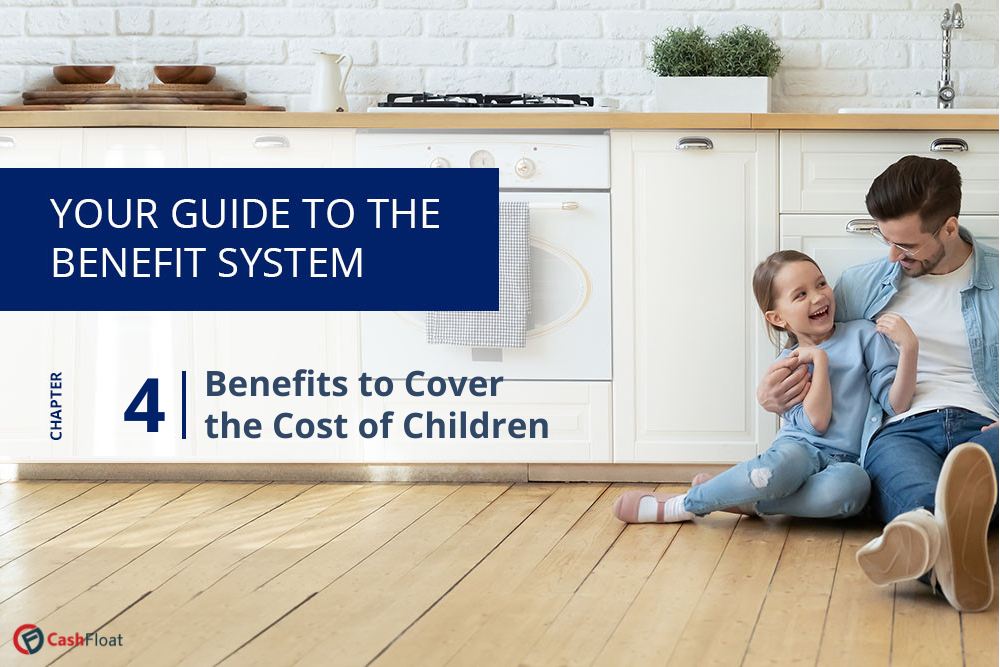
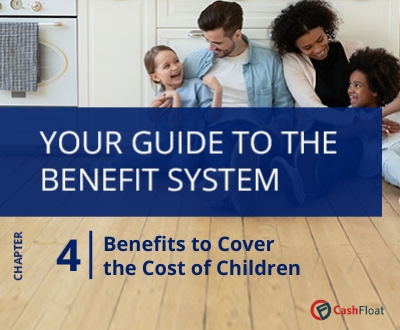
- All couples earning below £50,000 per year, with a child under 16 are entitled to the full amount of Child Benefit.
- Under Universal Credit, couples of 25+ can get extra support for their children on top of £594.04 per month.
In this chapter, we look at the help which families with children can receive from the state. Previously, the two main benefits for families with children were Child Benefits and Tax Credits. You can still claim Child Benefit as an independent benefit, but tax credits are changing. While some people still receive tax credits, gradually people receiving tax credits are being moved onto Universal Credit. New claimants for tax credits will usually be told to apply for Universal Credit instead.
What is Universal Credit?
Universal Credit is a new benefit which replaces Child Tax Credit, Housing Benefit, Income Support, income based Jobseeker’s Allowance, income based Employment and Support Allowance and Working Tax Credit. Rather than claimants making a claim for each of these benefits, their needs are assessed under one benefit and they receive one monthly payment under Universal Credit.
We will first look at Child Benefit, exploring who is eligible, how to make a claim and how much people can receive. After that, we will explain how Universal Credit works to replace tax credits, explaining what it is, who should make a claim, what people can expect to receive under it and whether or not it is a good idea to switch over. Lastly, we will look at tax credits explaining who can still receive them and what they can expect to receive.
Child Benefit
- Most parents are eligible for Child Benefit
- Child Benefit is paid to one parent or person who is responsible for a child under the age of 16 (or up to 20 if they are in approved education or training.)
- Child Benefit is £21.05 per week for the first child and £13.95 for each additional child.
- The government will pay the benefit into the bank account of a chosen adult every 4 weeks. The person who claims will get National Insurance credits towards their state pension if they are not working or if they earn less than £183 per week
- Child Benefit continues until the child turns 16 if they leave education or training. If they stay in approved education or training, it will continue until they are 20.
- If either you or your partner’s income is over £50,000, you will usually have to pay tax on Child Benefit that you receive. Once either you or your partner receive over £60,000, you will lose all of your Child Benefit through tax. Your combined income does not matter.
Normally child benefit is paid to the parent who is most responsible for their child/children. Usually, this is one parent who lives with them, cares for them and provides for them. However, parents who do not live with their children can claim if they pay at least the same amount towards them in providing things like pocket money, food and transport. On top of this, it can be paid to someone who has an informal arrangement to look after a friend or relative’s child if they are paying at least as much as the amount of Child Benefit to support the child.
There is no limit to the number of children that you can claim child benefit for and it can also be paid to people who foster or adopt a child. Only one person can receive Child Benefit for a given child.
| How much will you receive in Child Benefit? | |
|---|---|
| The Eldest/Only Child | £21.05 per week |
| Other Children | £13.95 per week |
| Limits on Child Benefit | 0* |
*While there is no limit to the number of children that you can claim Child Benefit for, the benefit cap may limit the total amount of benefits that you can receive.
How To Claim Child Benefit
If you are eligible for Child Benefit, you should fill in Child Benefit Claim Form CH2 and send it to the Child Benefit Office along with the child’s original birth certificate, an adoption certificate if they are adopted and their passport if they were born overseas.
Send your claim for child benefit to:
Child Benefit Office
Washington
Newcastle-upon-Tyne NE88 1ZD
It usually takes 6-12 weeks to process a new claim for Child Benefit. Claims can be backdated for up to 12 weeks. Make sure that you apply as soon as your child is born or as soon as they come to live with you if they are moving in, so you don’t miss out on any payments.
Having a baby can be an expensive time and often people end up taking little loans online to help get them through it. Once Child Benefit payments begin, the Government will transfer the money into your bank account every four weeks, usually on a Monday or Tuesday. If you are a single parent or receiving other state benefits such as Income Support, then you can arrange to have the money paid on a weekly basis.
You stop receiving Child Benefit when your child:
- Is between 16-20, if they leave approved education or training
- Turns 20 if they stay are still in approved education or training
- Starts paid work of more than 24 hours a week
- Begins an apprenticeship (if their apprenticeship is in England)
- Begins receiving benefits in their own right such as Income Support, Employment and Support Allowance or tax credits.
It is possible to get an extension of Child Benefit for up to 20 weeks, if your child is 16 or 17 and leaves approved education or training, and joins the Armed Forces or registers to enter work, training or full time education with certain ‘qualifying bodies’.
It is vital that you let the Child Benefit Office know of any changes in your circumstances or your child’s. You can be fined for making fraudulent Child Benefit claims.
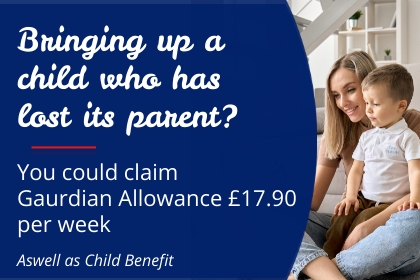
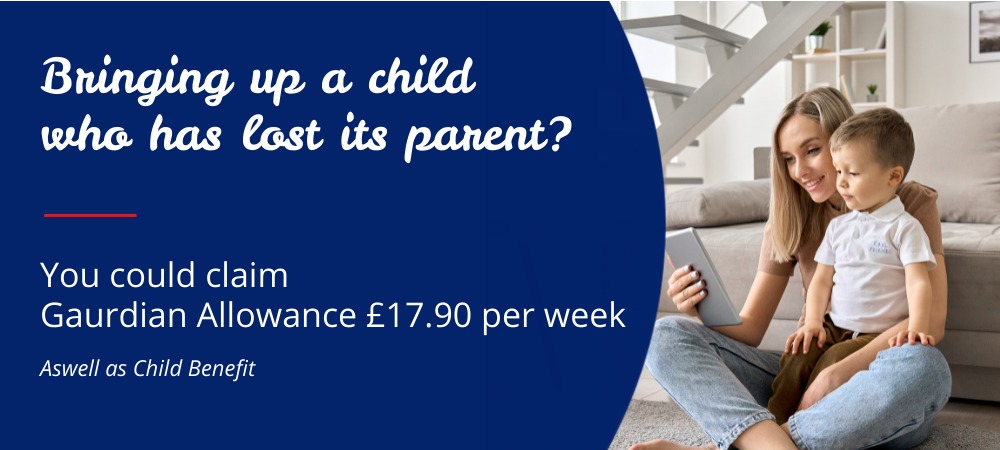
What is Guardian’s Allowance?
Guardian’s allowance is a benefit given to people who are raising a child whose parents have died. If you are raising a child whose parents have died and you qualify for Child Benefit for the child, then you can also apply for Guardian’s Allowance. The amount given is £17.90 per week and it is paid on top of Child Benefit. Under certain conditions, you can receive Guardian’s Allowance if the child’s parents are not dead.
Universal Credit for Parents
Here’s what you need to know about Universal Credit if you are a parent
- Universal Credit is replacing tax credits as a benefit for parents.
- You can apply for Universal Credit if you are on a low income or are out of work and if you and your partner have £16,000 or less in savings.
- Under Universal Credit you can receive financial support to help with the costs of looking after children.
- This is received on top of the standard Universal Credit amount.
- Children are normally classified as those under the age of 16 or up to the age of 20 if they are in approved education or training.
Previously, two of the main benefits available for parents were Child Tax Credits and Working Tax Credit. Under tax credits, parent’s income and needs were assessed and tax credits were awarded if they met the criteria. While some people still receive tax credits, Universal Credit is now replacing them. With the full introduction of Universal Credit in 2018, most parents who need financial help will now have to apply for Universal Credit.
People who are currently on tax credits will usually change to Universal Credit if they choose to, if they have to make a new claim for another benefit or if they have a change in circumstances which alters their current claim for tax benefits.

Is the assessment criteria the same for Universal Benefits as it is for tax credits?
While the assessment criteria for financial support for parents is similar under Universal Benefits, it is not the same. Not everyone will receive the same amount under Universal credit as they do under tax credits. If you are on tax credits, it is worth checking whether you will lose money before you choose to switch to Universal Credit.
Universal Credit to Cover the Living Costs of Children
The standard amount of Universal Credit for a couple over the age of 25 is £594.04 per month. If a couple over the age of 25 have children, they can receive extra support on top of the standard amount to cover the costs of having children. This money is to cover the daily expenses of having children and is separate to support which is available to cover childcare costs. If you also need extra support to cover childcare costs, go to Chapter 3 Part II, for information on this.
What is Available?
If you qualify for Universal Credit and you have either 1 or 2 children, then you will receive an extra amount on top of your standard Universal Credit allowance for each child.
For those that have 3 children or more, you will usually only receive extra support for more than 2 of them if they were born before 6th April 2017 and you were claiming support under Universal Credit for all of your children before that date. If that is not the case then you will usually only receive support for 2 of your children.
How much can I get?
| Number of Children and Eligibility Status | Extra Amount Received on top of Standard Universal Credit |
|---|---|
| For your first child | £281.25 (if they were born before 6 April 2017) £235.83 (if they were born on or after 6 April 2017) |
| For your second child (or any other eligible children) | £235.83 per child |
| A disabled child | £128.25 or £400.29 |
Under Universal Credit, you will either receive the higher rate of £400.29 per month or the lower rate of £128.25 per month for a disabled child. You will receive the higher rate if your child is already getting the Disability Living Allowance higher rate care component, already getting the Personal Independence Payment enhanced daily living component or is registered as blind. You will get the lower rate if your child is getting any other rate of Disability Living Allowance or Personal Independence Allowance.
Tax Credits
- Tax Credits are a means-tested mechanism to distribute income to low earners and are intended to stop welfare dependency.
- There are two kinds of Tax Credits: Child Tax Credit (CTC) and Working Tax Credit (WTC).
- You are entitled to Child Tax Credit if you are responsible for a child under 16 or under 20 if they are in approved education/training.
- CTC and WTC are paid into your bank account every 4 weeks until April 5th each year (when you must renew your claim). Only one household can receive it for a child.
Tax credits were introduced into the UK benefit system in April 2003 and are a means-tested state mechanism to distribute income to people on lower wages. The idea behind Tax credits is to lift people out of welfare dependency and encourage them to work. The problem before Tax credits was that as soon as claimants found a job, even if it was part-time and/or poorly-paid, they found that their benefits were cut, so there was no incentive to work. Tax credits were introduced as a way to stop penalising people for working.
You can now only apply for Child Tax Credit or Working Tax Credit if you already receive another tax credit.
| You may be eligible for Tax Credits if you earn: | |
|---|---|
| Individual | Under £13,100 per year |
| Couple | Under £18,000 per year |
| Couple with Children | Under £35,000 per year |
The amount you will receive in tax credit depends on;
- How old you are
- The number of hours you work
- The amount of children you have
- Whether you apply as an individual or as a couple.
There are two kinds of Tax Credits: Child Tax Credit (for families with children) and Working Tax Credit (for workers on low incomes, with or without children.)
Child Tax Credit
You can now only apply for Child Tax Credit if you already receive Working Tax Credit. If you do not already receive Working Tax Credit then you will have to apply for Universal Credit instead. If you are entitled to Child Tax Credit you may wish to switch to Universal Credit anyway.
Already receiving Working Tax Credit? You are also entitled to Child Tax Credit if you are responsible for a child under 16 or if you have a child under 20 who is in approved education or training. There is no set limit for your income as it depends on your circumstances and that of your partner.
On the gov.uk website, there is a Tax Credit calculator, which can give you an idea of how much you will receive. Give it a try and see if you will be able to receive any credit.
Only one household can receive Child Tax Credit for a given child. So, if you separate from your partner or spouse and you cannot agree with your former partner about who should receive it, the Tax Credit Office will decide for you when you both apply. Normally the person who is most responsible for a child will receive Child Tax Credit. You can receive CTC even if you are out-of-work.
Child Tax Credit does not affect your Child Benefit. If you claim Child Tax Credit then you will be able to receive the full amount of Child Benefit.
Should I Switch to Universal Credit?
If you already receive Working Tax Credit and you are entitled to receive Child Tax Credit, then you may wish to apply for Universal Credit instead. This will end your claim to tax credits and you will be assessed under the criteria for Universal Credit. Before deciding whether to apply for Universal Credit or to continue receiving tax credits it is worth checking that you will not lose money by switching over.
| How much will you receive in Child Tax Credits: | |
|---|---|
| ‘Family element’ (flat payment) | £545 per year |
| For each child | Up to £2,830 per year (on top of the flat rate) |
| For a disabled child | Up to £3,415 per year (on top of the child payment and flat rate) |
| A severely disabled child | Up to £1,385 (in addition to other elements) |
If any of your children were born on or after 6th April 2017, you will only be able to receive Child Tax Credit for up to 2 children. You will also only be able to claim the ‘family element’ of Child Tax Credit if at least one of your children was born before this date.
How To Claim For Child Tax CreditTo claim Child Tax Credit, if you are already receiving Working Tax Credit, you should update your existing claim by reporting the change in your circumstances which has led you to claim Child Tax Credit.
Normally you will have to contact the Tax Credit Office by phone (0345 300 3900) or online, and they will send a form to you, which you can use to notify them of your change in circumstances. The form usually takes about two weeks to arrive, and the processing of your claim will take a further five weeks.
If you just need to renew an existing Child Tax Credit claim, then you can do this by calling the helpline.
Child Tax Credit is paid every 4 weeks from the date of your claim into your bank account until the end of the tax year (5th April). After this time, you should renew your claim if there are no changes in your circumstances or you should notify the Tax Credit Office if there are any changes in your circumstances. A change in your circumstances could lead to a change in the amount you receive.
You can receive an increase in Child Tax Credit if;
- Your income goes down by £2,500 or more
- One or more of your benefits stop or are reduced
- You have another child or your childcare costs go up.
However, your Child Tax Credit could be reduced or even stopped if;
- Your income goes up by £2,500 or more
- You do not renew your claim
- The benefits office mistakenly paid you too much, or you claimed too much in benefits
- Your child of 16-19 leaves approved education/training
- You move onto Universal Credit.
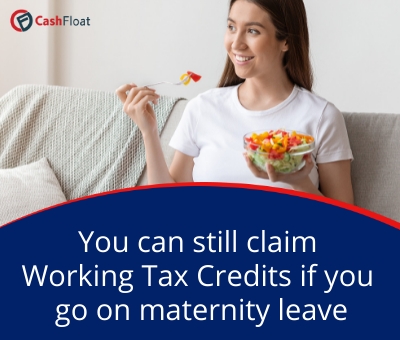
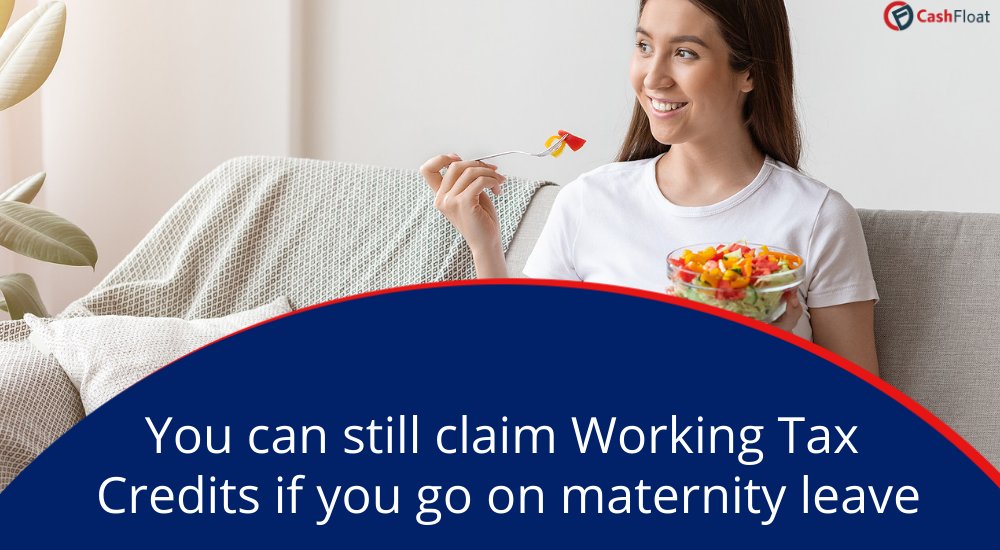
Working Tax Credit
- Working Tax Credit is now a legacy benefit. While some people still receive it, new claimants for it will usually need to claim for Universal Credit instead. People receiving Working Tax Credit will gradually be moved onto Universal Credit, with the government aiming to move everyone over by 2024.
- You can now only apply for Working Tax Credit if you already receive Child Tax Credit.
- You are eligible for Working Tax Credit if you already receive Child Tax Credit, if you work at a low-paid job and if you work a certain number of hours per week. The number of hours which parents have to work before receiving Working Tax Credit is reduced, making this a useful benefit for working parents.
- Single parents can receive up to £2,045 per year.
- You should let the Tax Credit Office know of any changes in your circumstances. In some cases (such as maternity leave) when you are not working, the WTC will continue to be paid for a certain period.
You are eligible for Working Tax Credit if;
- You already receive Child Tax Credit
- Both you and your partner are on a low income. There is no set limit for income because it depends on your circumstances. You can use the tax credits calculator to see if you are eligible.
- The limits are higher for people with children or those who pay for childcare.
In addition to these requirements, you must;
- Work a certain number of hours (which can vary by circumstance – see table below)
- Expect to be paid for your work
The number of hours you should work per week in order to be eligible for working tax credits depends on your circumstances and your age. You can find out how many hours you must work in the table below.
| How many hours must I work to be eligible for Working Tax Credits? | |
|---|---|
| Age | Amount of Hours You Must Work |
| 25-59 | At least 30 hours |
| 60 or over | 16 hours |
| Disabled | 16 hours |
| Single with 1 or more children | 16 hours |
| Couple with 1 or more children | Usually, at least 24 hours between the two of you (with one of you working at least 16 hours).* |
* Couples with 1 or more children are entitled to Working Tax Credit if they work less than 24 hours between the two of them, if either of them is disabled, incapacitated due to ill health, over the age of 60, is entitled to carer’s allowance or is in hospital or prison. One person of the couple must work at least 16 hours per week.
How To Claim For Working Tax Credit
To claim Working Tax Credit, if you are already receiving Child Tax Credit, you should update your existing claim by reporting whatever change in your circumstances has entitled you to receive Working Tax Credit.
Normally you will have to contact the Tax Credit Office by phone (0345 300 3900) or online, and they will send you a form which you can use to notify them of your change in circumstances. The form usually takes about two weeks to arrive, and the processing of your claim usually takes another five weeks.
If you just need to renew an existing Working Tax Credit claim you can do this by calling the helpline.
How much will I receive in Working Tax Credit?
If you qualify for Working Tax Credit, you will receive a ‘basic amount’ of up to £3,040. The amount that this is depends on your income or circumstances. On top of this you will then receive ‘extra elements’, as shown below.
| Extra Element | Amount for Extra Element |
|---|---|
| Couple applying together | Up to £2,045 |
| Single parent | Up to £2,045 |
| Work at least 30 hours | £825 |
| Claimant with disability | £3,220 |
| Claimant with severe disability | £1,390 (usually on top of disability payment) |
You will usually need to supply the Tax Credit Office with your National Insurance number and your income for the previous tax year. Also, you should keep records of your income, bills, payslips, benefits, other tax credits, childcare costs and children’s education for the previous 3 years.
You should let the Tax Credit Office know of any changes in your circumstances within 30 days in case your payment needs to be adjusted up or down. You could be fined up to £300 if you do not report certain changes in your circumstances to HM Revenue and Customs within 1 month, and up to £3,000 if you give false information.
Did you know that even if you are not working, you can continue receiving WTC for a certain number of days or weeks according to your circumstances? These include:
| Receiving Working Tax Credits when you stop working: | |
|---|---|
| You lose/leave your job | 4 weeks |
| Maternity leave | First 39 weeks of leave |
| Paternity Leave | For the period of your paternity leave |
| Off work sick | First 28 weeks |
| On strike | Up to 10 days |
| Laid off | 4 weeks |
You should contact the Tax Credit Office to let them know if you are not working; do not miss out on something you are entitled to.
Should I fill in the Child Benefit claim form even if I don’t intend to receive it?
Even if you do not expect to receive Child Benefit, you ought to fill in the claim form. Not only will you receive National Insurance Credits which will count towards your state pension but your child will be registered to get a National Insurance number at the age of 16.
Can I receive both Child Tax Credit and Working Tax Credit?
Yes, if you are on a low income and in work, it is possible to receive both Child Tax Credit and Working Tax Credit. However, with the introduction of Universal Credit, you must already be claiming for both or already be receiving one in order to receive the other.
Can I receive both Child Tax Credit and Universal Credit?
No. As soon as you apply for Universal Credit, your tax credits will be stopped because Universal Credit covers these benefits. Universal Credit also covers Housing Benefit, Income Support, income-based Jobseeker’s Allowance (JSA) and income-related Employment and Support Allowance (ESA). If you receive any of these benefits as well, they will be stopped as soon as you start receiving Universal Credit.
Should I switch to Universal Credit?
If you already receive Working Tax Credit and you are entitled to receive Child Tax Credit, then you may wish to apply for Universal Credit instead. This will end your claim to tax credits and you will be assessed under the criteria for Universal Credit. Before deciding whether to apply for Universal Credit or to continue receiving tax credits it is worth checking that you will not lose money by switching over.
What are Legacy Benefits?
Legacy benefits are the benefits which are being replaced by Universal Credit. These are Income-based Jobseekers Allowance, Income-related Employment and Support Allowance, Income Support, Housing Benefit, Child Tax Credit and Working Tax Credit.
How soon should I let the Tax Credit Office know of any changes in my circumstances?
Ideally, you should let them know as soon as possible. You could be missing out on money you are entitled to if you do not. Also, if your change in circumstances means that your CTC has to be reduced, you can be fined up to £300 if you do not report this to them within 30 days. The last thing you need is to have to take a text loan to pay off your fine!
Am I entitled to Working Tax Credit if I am self-employed?
In some circumstances, you are entitled to WTC if you are self-employed. However, your business must be commercial, regular and profitable. Also, you must keep business records and follow any regulations applicable to your profession. For example, you should have the right licence, insurance, etc. If your average hourly profit is less than the National Minimum Wage, you may be asked to provide proof of your business practices (such as a business plan or evidence of how you have promoted your business).
Bringing up children is never cheap. In fact, the Money Charity estimates that it costs a single parent about £28.16 per day to bring up a child. Child benefit and tax credits are designed to help families with children to cope with the high expenses associated with child rearing.
Of course, it is sometimes easier and faster to simply apply for a small personal loan. But, like most things, the more convenient something is, the more it costs. Trying to bring up your children using just short term credit as your source of quick money uk, is a bit like doing all your shopping at the local convenience store. Very convenient, very easy, but very expensive.
So although it might be confusing, it is worth putting in the effort to claim the correct benefits. In the long run, your hard work will pay off.


